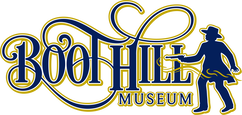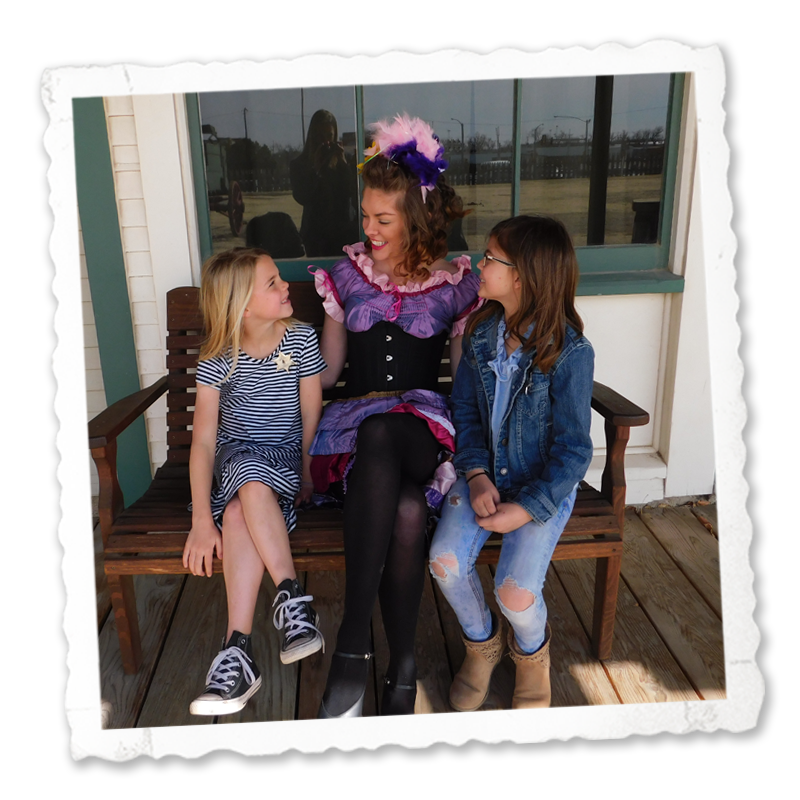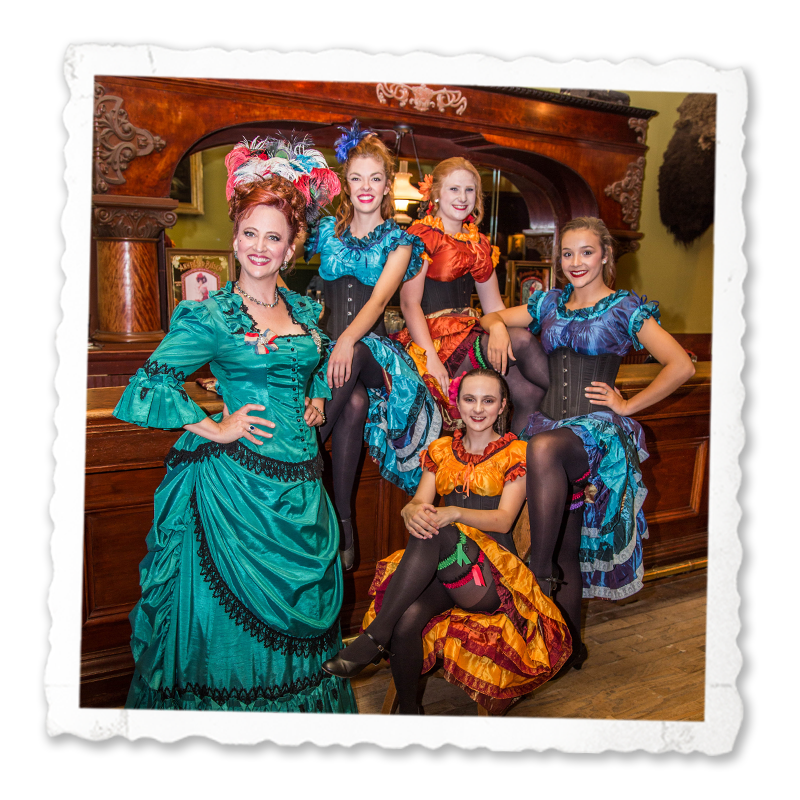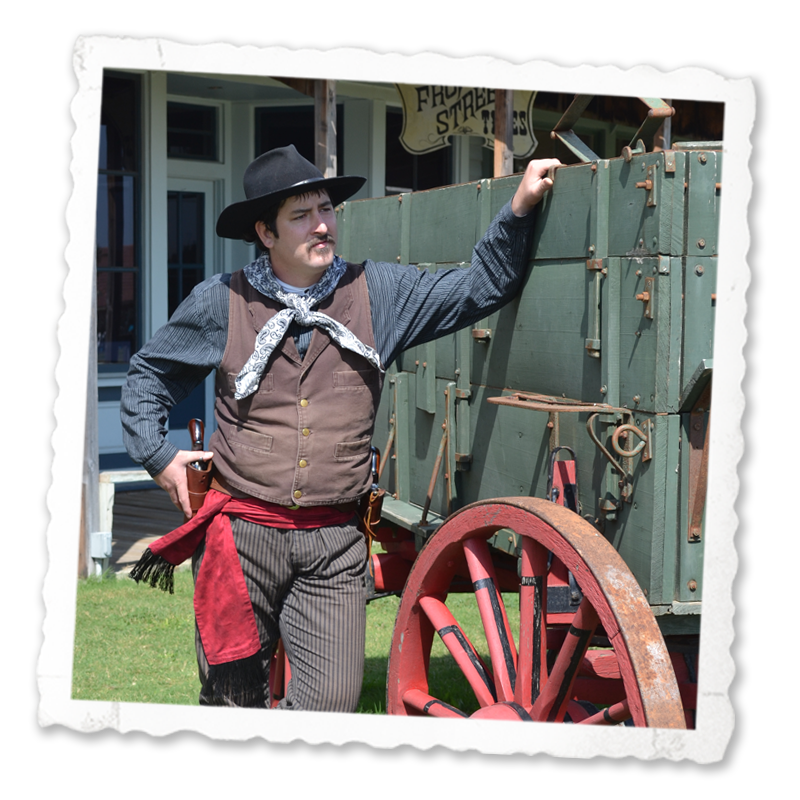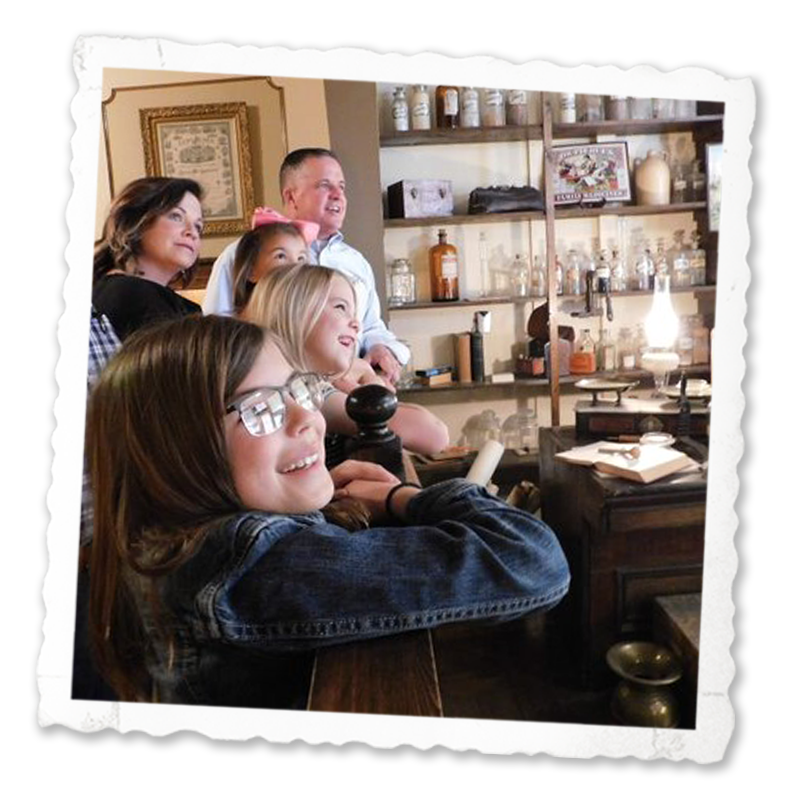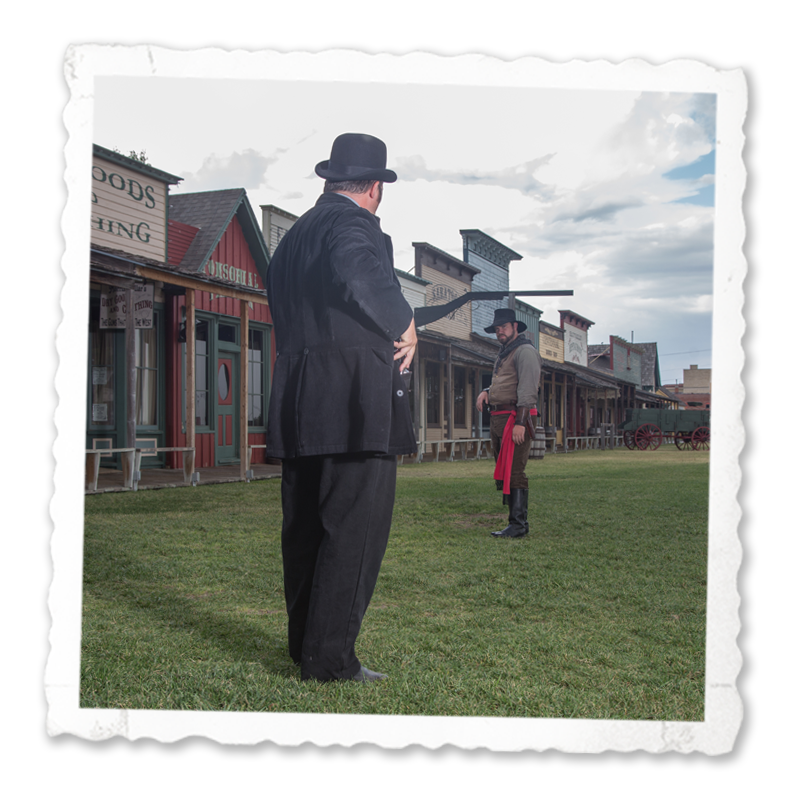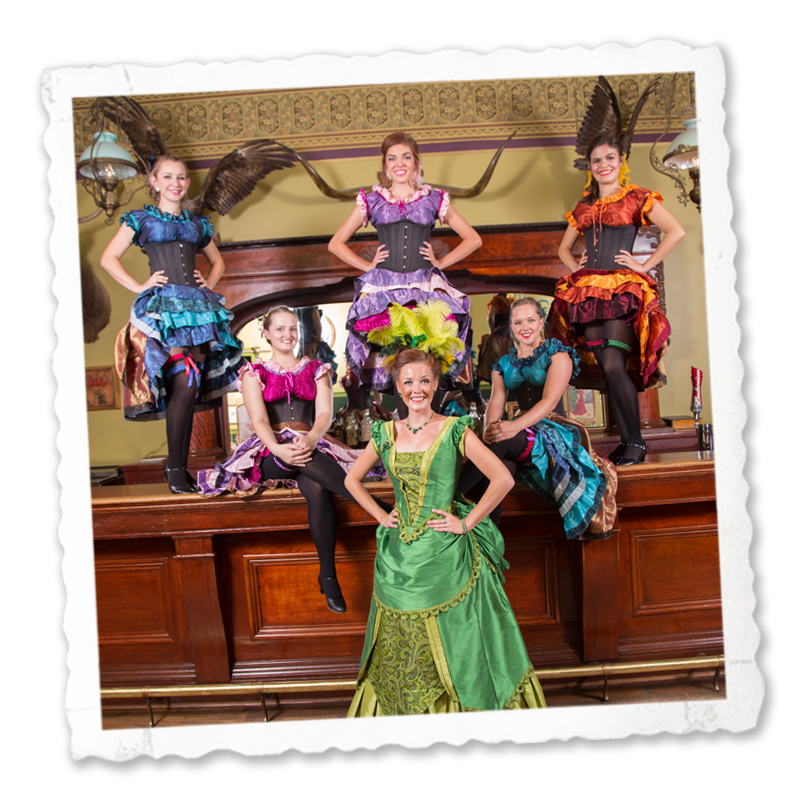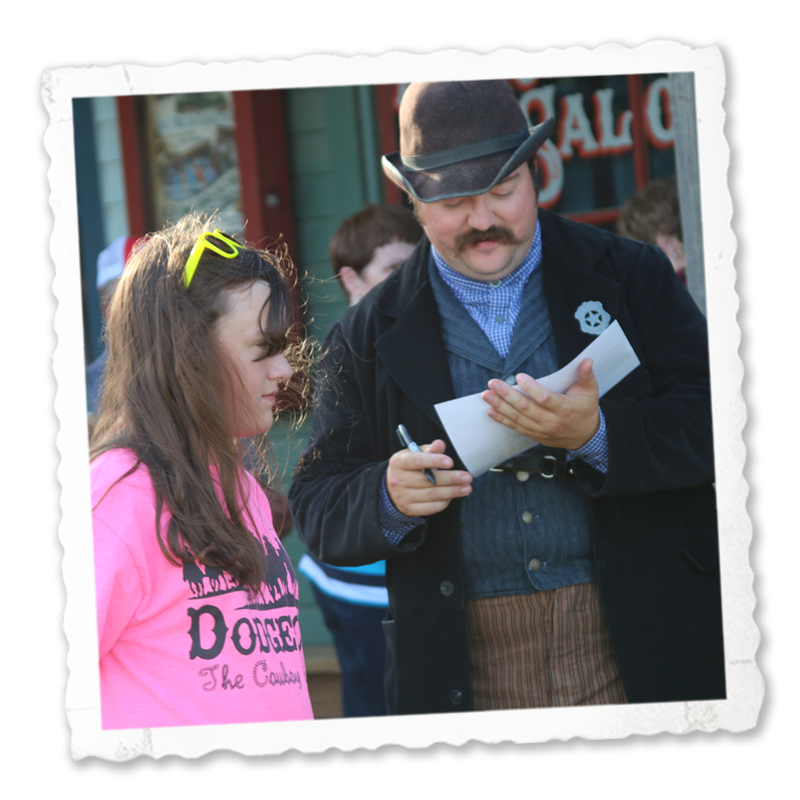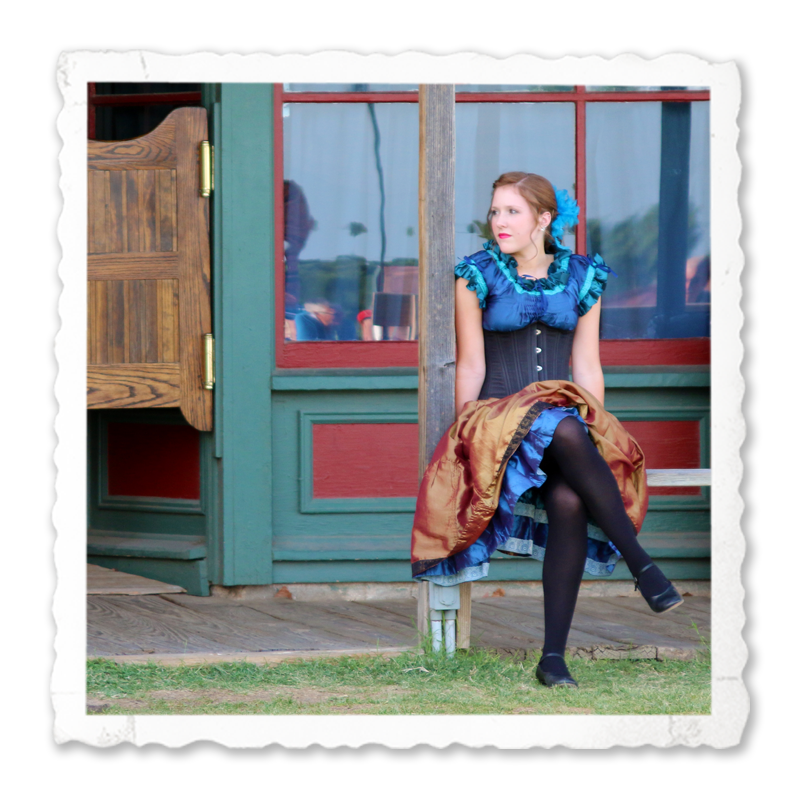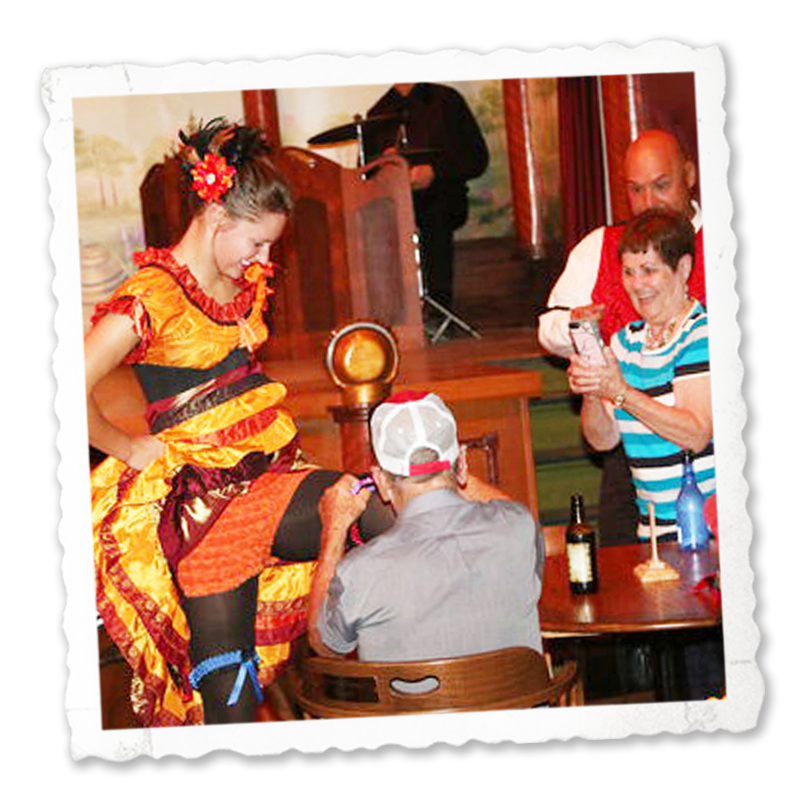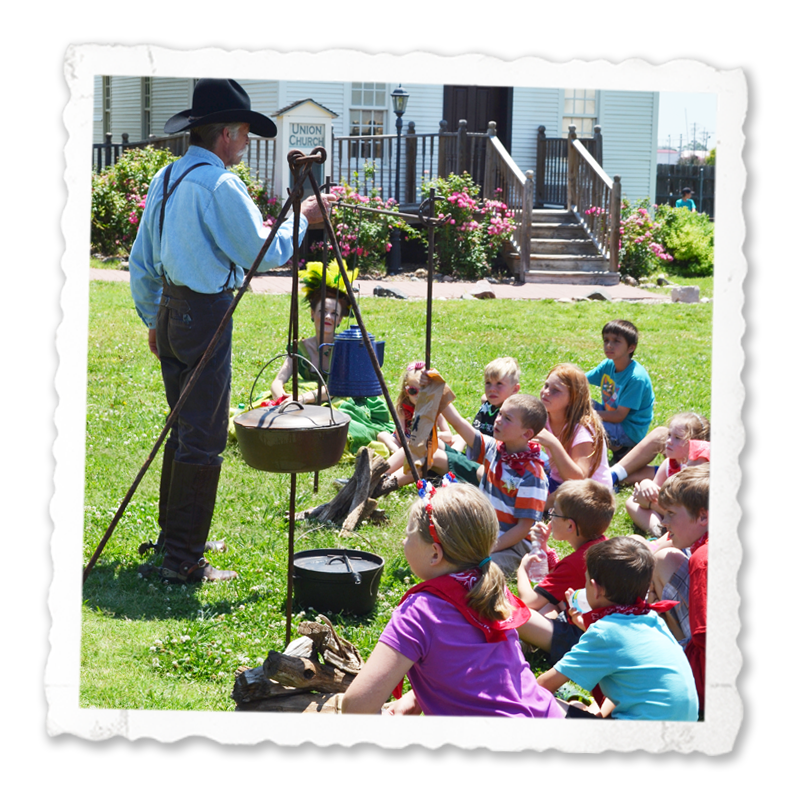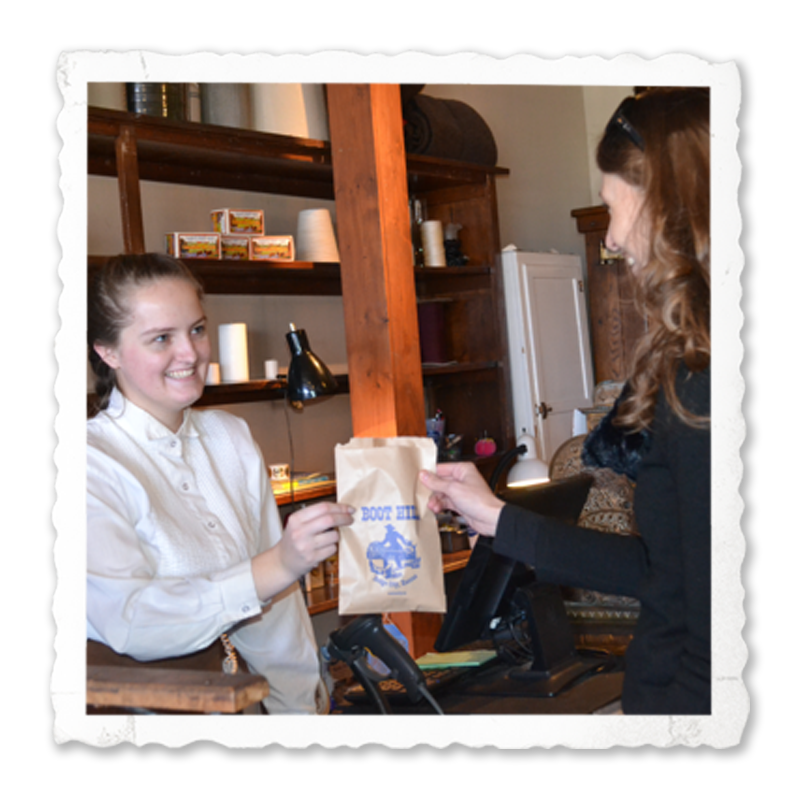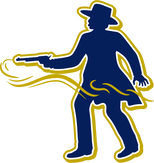Long Branch Variety Show
LONGEST RUNNING VARIETY SHOW IN THE NATION
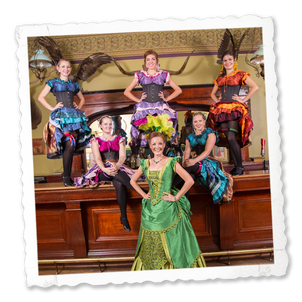
The arts community in Dodge City has been blessed with many outstanding performers throughout the years dating all the way back to its beginnings with Chalkley Beeson and the Dodge City Cowboy Band. Mr. Beeson was an early owner of the Long Branch Saloon and his saloon boasted musical entertainment in addition to the normal saloon fare. When the Boot Hill Jaycees embarked on a reconstruction of Front Street in 1958 based on photographs of the day, the Long Branch Saloon was reborn. And while the reconstructed saloon was not designed to be a performance space, local optometrist Lewis Mock and his talented wife Rosemary saw an opportunity. They approached the board of the Museum about putting together a saloon show in the Long Branch. It would be a period piece, over the 4th of July weekend, and would include Dr. Mock playing his signature ragtime piano, the first troupe of Long Branch Can-Can dancers and Mrs. Mock would host the show portraying Dora Hand.
MISS KITTY AND THE LONG BRANCH SALOON
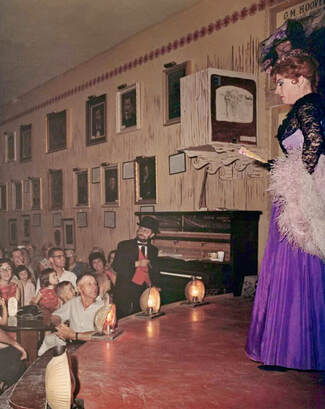
Dora Hand (whose stage name was Fannie Keenan) was a saloon singer in early Dodge City who met with a tragic demise in October of 1878 at the hands of James “Spike” Kenedy. Mrs. Hand was friends with the mayor – James “Dog” Kelley – and was staying at his home along with her fellow performer Fannie Garretson. The mayor was at Ft. Dodge in the infirmary nursing a stomach condition. Spike Kenedy intended to kill the mayor in what was Dodge City’s first drive-by shooting (he actually was on horseback and fired into the house while riding past). He did not know that Dora & Miss Garretson were there. The fatal bullet passed through the bedding where Miss Garretson slept, broke through the thin wall and struck Dora Hand, killing her instantly. Wyatt Earp and Bat Masterson were part of the posse that went after Spike Kenedy. Kenedy was later acquitted due to lack of evidence.
It seemed only fitting that “Dora Hand” would host the show in the Long Branch Saloon. So the Mocks gathered music and a group of local high school girls to be the first Can-Can dancers and the Long Branch Variety Show was born. The show was such a huge success that it was decided to make it a nightly production for the rest of the summer. By the summer of 1959, it was clear that Gunsmoke was a television hit and visitors expected to see Miss Kitty in the Long Branch Saloon. So Rosemary Mock created the character of the Dodge City Kitty – belting out songs and entertaining visitors to the Long Branch Saloon.
It seemed only fitting that “Dora Hand” would host the show in the Long Branch Saloon. So the Mocks gathered music and a group of local high school girls to be the first Can-Can dancers and the Long Branch Variety Show was born. The show was such a huge success that it was decided to make it a nightly production for the rest of the summer. By the summer of 1959, it was clear that Gunsmoke was a television hit and visitors expected to see Miss Kitty in the Long Branch Saloon. So Rosemary Mock created the character of the Dodge City Kitty – belting out songs and entertaining visitors to the Long Branch Saloon.
STILL RUNNING STRONG FOR OVER 65 YEARS
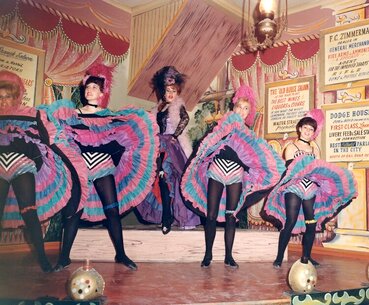
The Long Branch Variety Show is the longest running seasonal theatrical show in the nation. The show opens its nightly run on Memorial weekend and offers a special sneak preview for Boot Hill Museum Association members on the previous Thursday.
Over the years, it has taken hundreds of local singers, dancers, actors, piano players & comics to bring the Long Branch Variety Show to life. For the first 25 years – only three women held the full-time position of Miss Kitty. Beginning in 1958, first as Dora Hand then as Dodge City Kitty, it was Rosemary Mock. She was followed by Nellis Reinert who filled the role until 1976 when Connie Hudnett took over and stayed until 1984.
It was a tremendous responsibility to perform 6 or 7 nights a week and so nine years was about the normal run for Miss Kitty. Following Mrs. Hudnett’s departure, several other women filled the role but for much shorter runs and fewer nights per week. Today’s cast includes five ladies filling the Kitty role. Alicia Ocker, Christina Haselhorst, Dee Dee Royle, Bonnie Castelli, and Amy Reinert-Price will don the feathers and fabulous costumes and host this year’s version of the show.
The basic format of the show has remained the same throughout the years: Miss Kitty and her piano player host musical, dramatic, and comedy routines in the most famous saloon on Front Street. The one other constant remaining from the original version of the show is the Can-Can dancers who perform their signature piece as the grand finale of the show. And as in the early days, the dancers also do a second number earlier in the show.
Fans of the show will remember Clancy the bartender (portrayed by Gordon Day) who could croon an Irish tune better than anyone else, Johnny Little Wolf – the half-breed Indian who was just itching to pick a fight, Sam McGill – the mangy buffalo hunter who replaced Johnny Little Wolf (because of political correctness), Harry the town drunk originally portrayed by Harry Rice and later Walter Hudnett (whose signature slide down the bar is legendary!), the Mechanical Man routine originated by Greg Smith & Hannes Zacharias (as well as their Flying Gambonos circus act routine), Lizzie Overly portrayed by Sara McFarland, Gertie Mae Festerbein portrayed by Amy Brax, and the Cremation of Sam McGee dramatic reading.
In 1984, following the retirement of Gordon Day, the character of Chalkley Beeson was added as the owner of the saloon who hired Katherine “Kitty” Russell to put on a show in his saloon. Originally performed by Greg Smith, the Mr. Beeson character still assists Miss Kitty with hosting duties and tries to keep his bartenders and wife, Ida, in line.
Over the years, it has taken hundreds of local singers, dancers, actors, piano players & comics to bring the Long Branch Variety Show to life. For the first 25 years – only three women held the full-time position of Miss Kitty. Beginning in 1958, first as Dora Hand then as Dodge City Kitty, it was Rosemary Mock. She was followed by Nellis Reinert who filled the role until 1976 when Connie Hudnett took over and stayed until 1984.
It was a tremendous responsibility to perform 6 or 7 nights a week and so nine years was about the normal run for Miss Kitty. Following Mrs. Hudnett’s departure, several other women filled the role but for much shorter runs and fewer nights per week. Today’s cast includes five ladies filling the Kitty role. Alicia Ocker, Christina Haselhorst, Dee Dee Royle, Bonnie Castelli, and Amy Reinert-Price will don the feathers and fabulous costumes and host this year’s version of the show.
The basic format of the show has remained the same throughout the years: Miss Kitty and her piano player host musical, dramatic, and comedy routines in the most famous saloon on Front Street. The one other constant remaining from the original version of the show is the Can-Can dancers who perform their signature piece as the grand finale of the show. And as in the early days, the dancers also do a second number earlier in the show.
Fans of the show will remember Clancy the bartender (portrayed by Gordon Day) who could croon an Irish tune better than anyone else, Johnny Little Wolf – the half-breed Indian who was just itching to pick a fight, Sam McGill – the mangy buffalo hunter who replaced Johnny Little Wolf (because of political correctness), Harry the town drunk originally portrayed by Harry Rice and later Walter Hudnett (whose signature slide down the bar is legendary!), the Mechanical Man routine originated by Greg Smith & Hannes Zacharias (as well as their Flying Gambonos circus act routine), Lizzie Overly portrayed by Sara McFarland, Gertie Mae Festerbein portrayed by Amy Brax, and the Cremation of Sam McGee dramatic reading.
In 1984, following the retirement of Gordon Day, the character of Chalkley Beeson was added as the owner of the saloon who hired Katherine “Kitty” Russell to put on a show in his saloon. Originally performed by Greg Smith, the Mr. Beeson character still assists Miss Kitty with hosting duties and tries to keep his bartenders and wife, Ida, in line.
THEME SONG & MUSIC
Two of the shows earlier theme songs “Down at the Long Branch Saloon” written by Rosemary Mock and “The Long Branch Saloon in Dodge City” written by Bruce Dillman, Joann Bock, and George Henrichs are used in the current version of the show. “The Long Branch Saloon in Dodge City” is the show opener and “Down at the Long Branch Saloon” is the finale. This year, Mr. Beeson will introduce a song written for the Dodge City Centennial in 1972 (and reworked for this 2012's 140th anniversary of the City) entitle “The Legend of Dodge City”. Last summer, Miss Kitty introduced a song originally written for Amanda Blake to use during promotional tours as Gunsmoke’s Kitty, entitled “Long Branch Blues”.
The piano player has been integral to the show since the very beginning when Dr. Mock played as the Professor. He later became known as “Doc” and that name has stuck until this day for any of the men who have played in the Variety Show.
The piano player has been integral to the show since the very beginning when Dr. Mock played as the Professor. He later became known as “Doc” and that name has stuck until this day for any of the men who have played in the Variety Show.
COUNTRY STYLE DINNER & WORLD FAMOUS GUNFIGHTERS
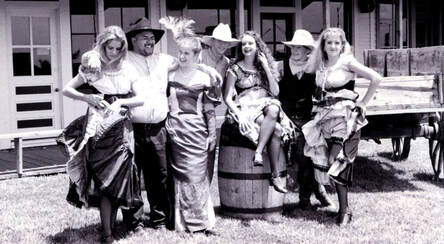
In addition to the nightly Long Branch Variety Show, the Museum also offers its Country Style dinner served in the Varieties Theater preceding the show. At 6:30pm, the Boot Hill Museum Gunfighters present a reenactment of a shoot-out on old Front Street. The gunfight has been an integral part of the summer fare since the very earliest days of the show. The gunfight troupe works very hard to make sure their costuming is accurate and that their stunts are convincing (while still being safe for the performers & audience).
